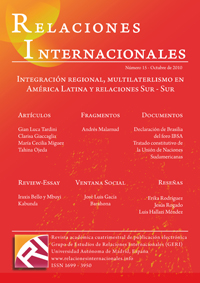Presidential Diplomacy and the Institutional Underpinnings of MERCOSUR. An Empirical Examination
Keywords:
international economic relations , political integration , economic integration , South AmericaCopyright (c) 2010 Andrés MALAMUD

This work is licensed under a Creative Commons Attribution-NonCommercial-NoDerivatives 4.0 International License.
Abstract
The relative success of the Southern Common Market (MERCOSUR) is a puzzle for most theories of regional integration. This is due to its having achieved remarkable progress in spite of lacking features such as significant levels of previous interdependence (demand factor) or major regional institutions (supply factor). To account for this puzzle, it has been claimed that the operation of MERCOSUR rests on presidential diplomacy. Such a mechanism is understood as the resort to direct negotiations between the national presidents whenever a crucial decision has to be made or a critical conflict solved. This article argues that presidential diplomacy—understood as political, summit diplomacy as opposed to institutionalized, professional diplomacy—is insufficient to account for the performance of MERCOSUR. Through the empirical analysis of three critical episodes, the article shows how institutional structures, shaped by the system of government of the member countries, have sustained presidential intervention and, hence, the process of regional integration.





